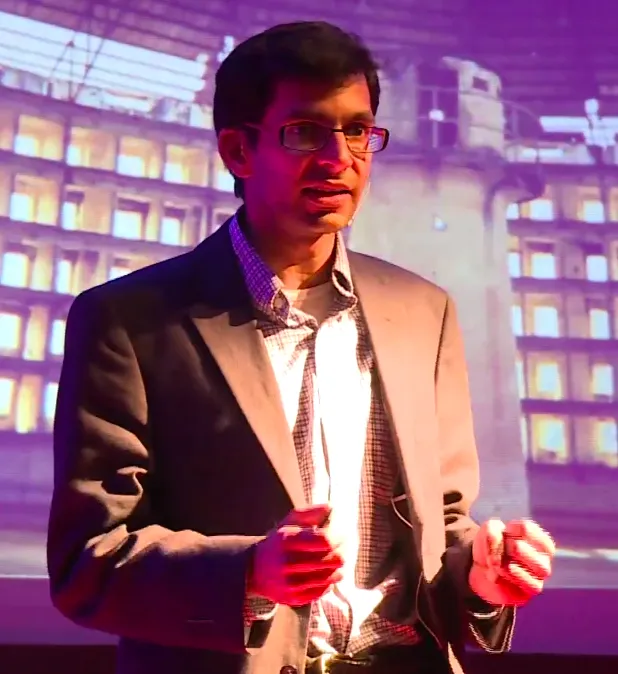Hidden Reflex: An Epic way to empower users
A few months before Edward Snowden’s catastrophic revelations about the NSA’s surveillance activities shook the world, Alok Bharadwaj was perturbed at the apparent lack of privacy online. He recounts, “Once if I researched a particular mobile phone, subsequent websites I go to have ads of the same phone there. Literally I have been so taken aback by that experience, I have instinctively turned my head to see who’s watching from behind me.”

Bharadwaj is part of a team that created the Epic privacy browser, a product from the stable of software start-up Hidden Reflex, which is dedicated to protecting what individuals browse online. Epic is the first browser from India and the first of its kind in the world. Bharadwaj speaks to YourStory about how a music and philosophy major came to found a software start-up, counteracting the ‘Mind over mind’ abuse of power model and why privacy may be the next big thing, but it is ultimately a fundamental human thing.
What was your childhood like and what were your formative influences? When did you decide what to do with your life?
I probably still haven't decided what to do with my life. I am figuring it out as I go along.
I grew up in the United States and that is where I am based now. I grew up around computers, a fact that probably sparked my interest in them. One of my earliest memories is of my parents and their punching cards. The first computer that I used was one running on CPM. I did a lot of basic programming in my childhood. In college though my interests changed and I studied philosophy and music.
Given that you plunged into an investment banking career right after college and were deeply into computers and programming till before college, your college majors sound like an odd choice.
I was interested in doing something creative. Philosophy and music really appealed to me in that aspect.
From programming to philosophy, music, investment banking, teaching, research and now an entrepreneur- that is a puzzlingly diverse array of career choices. What is the common thread through all these?
I don't know of there's any common thread except that these are all human endeavours. I worked in banking for about few years where I was drawn towards technology companies. I left because I wanted the freedom to explore things on my own. To that end I became a teacher for four or five years until I started Hidden Reflex. I taught mostly writing and mathematics. During this time I worked with a professor at Columbia on some books and research papers.
Through all the years over the different kinds of work I have done, there have been great times and times when I didn't enjoy it much. But teaching felt the most rewarding when I clicked with a student. That feeling when you can teach someone to do something they previously didn't know is invigorating and incredibly validating.
In contrast I felt that the culture in banking was not very good. People earn astonishingly high salaries but the level of competence falters. In comparison teachers are good at what they do because they are so committed to their job, despite the much lower salary paid to them. That is an epiphany that has stayed with me over time.
By bypassing conventional career routes and transcending such different levels of art, science and technology in your life are there innate criteria of fulfillment that you are striving towards?
I like to learn new things and whatever I do, I like to do a really good job at it. I didn't plan the whole thing out but went with what felt right at a certain stage.
What was the motivation and vision behind founding Hidden Reflex?
I felt that there was a lot of opportunity in software and that increasingly more and more businesses would become taken over and driven by softwares.
What resources did you have at the time of starting up? What challenges and barriers did you have to tackle along the way?
In the early days getting the hang of developing a product was a major challenge. The process of product development continues to be tough. Recruiting good software engineers, and retaining them, especially in Bangalore is difficult. Growing your user base is hard. Depending on what kind of product you make, making money is difficult. Software at large is a difficult business to make work.
In terms of resources we started with very little. There were just a couple of us and we continue to be a pretty small team. We were somewhat bootstrapped. We had raised a bit of capital but need to raise some more for sure.
Who all are your core team comprised of?
There's me, Mr. Sai Krishna and Sathi Babu. They are software engineers and focused on the technical side of the product. I am on the business side of things.
When you decided to create Epic, the world was still a few months away from Edward Snowden's NSA revelations. What made you think there would be a market for this kind of a product?

When I was on the internet I realized that there were dozens of independent companies that were trying to track my browsing history. We felt that we didn't want such companies tracking us and having this kind of data on us. We felt that this tracking had gotten out of hand and that is why a product like Epic was sorely needed. At the time this was against tracking by private companies.
When Edward Snowden came out with his revelations, we were as shocked as the rest of the world at how much tracking goes on by the governments, especially the US government.
What kind of reception did Epic get from users from India and the world?

Epic has been really well received overall. It's in use in a about a hundred and eighty countries all over the world. Since its launch Epic has had about two hundred and fifty thousand downloads- not a huge number but not small either. We hadn't promoted it in the past. We were concentrating on the product itself. Now we are going to be promoting it properly.
We are happy with Epic's performance because out of the of the two hundred and fifty thousand downloads, more than a third continue to use it. Out of one in six downloads, forty thousand people will use it on any given day.
Did you have hostile reactions from companies or government reps or any other agency?
Yeah definitely. We receive angry emails and accusations from people who are doubtful whether we are living up to our claims. In most cases, after we talk to them, they usually turn around a hundred and eighty degrees and respect our commitment to privacy. We have about a thousand people who have joined our forum who are having discourses and discussions about how we can make browsing more private and how are product can be evolved.
Since we are a US domiciled company, we are legally incorporated in the US. So a lot of people have doubts about the authenticity of our commitment to privacy thinking that we are a US based company. But given that our development team is in India and that they have control over the code, reassuring them becomes easy. People trust India. They don't expect India to spy on them. We are finding that everyone has a lot of suspicion of US based companies so battling that bias becomes a challenge. We have put in many kinds of safeguard to prevent instances of US government snooping.
I read that one of your main investors of Washington Post. I gather that this was before it was bought by Amazon. Given that Amazon, like many other large American corporations, are very antagonistic about whistleblowers shining the light on nefarious government activities, how did that pan out for Hidden Reflex?
Actually the Washington Post a really big company. They sold the newspaper to Amazon, but the company exists on its own. WP continues to own their stake with Hidden Reflex and they really believe this issue with privacy is going to continue growing.
In your Ted talk you spoke about Jeremy Bentham's eighteenth century panopticon prison design where convicts lost their spirit and censored their own actions because they believed they were being watched all the time. How do you think this analogy plays out in the modern era where the internet is the Panopticon and everyone is a convict without having committed a crime?

Once you realize you are being watched you start censoring yourself. That's when you start losing your freedom. Already a lot of writers who have been polled have said in a very strong proportion that now that they know the government is watching them they have stopped doing some searches that they had thought to do, that they are more careful online. We are already seeing the impact of how people are not freely investigating, associating and sharing knowledge online. This hesitancy is self imposed. That is dangerous because mass surveillance is incompatible with a free and open society.
We are brought up on the legacy of the Cold War. We shudder when we hear about Stalin's KGB or Hitler's Gestapo. We make movies and write books about these totalitarian regimes and are so proud that we don't live in those times anymore. Then why do you think the modern 21st century individual, who is emancipated and knowledgeable, is handing over their existence readily to be exploited thus? We don't seem to be very bothered that we are the ones making history repeat itself.
I truly believe that as people become more and more aware about what's going on, they are going to take steps- like using Epic- to protect their privacy. Every government sets up some kind of a secret police/surveillance station who are on a mission to collect data. They become these kinds of monsters or machines who need to keep collecting and it gets very hard to control their appetite. It gets out of hand. Something like this seems to have happened with the NSA where the director admitted that he had lied to the Congress- a body they were supposed to be reporting to- about what they had been doing. In these circumstances it is imperative for the individual to wake up and take active steps to protect themselves, and society at large.
What is alarming is the complete lack of consequence on NSA's part to answer for its crimes. Even after so many violations have come to light, they are not hard pressed to be answerable for them while whistle blowers like Snowden continue to pay the highest price. Dianne Feinstein, chairman of the US Senate Intelligence, insists that the NSA is not a surveillance program but a collection of data. What can the individual do to counteract and stand up to such hypocrisy and abuse of power?
I think that everyone has to be politically active and at least indicate to their governments that this behaviour is not okay. Apathy breeds inaction and that gives agencies much more leeway to get away with what they are doing. As more and more people protest about their privacy- which is an intrinsic human right- getting violated, the less circumspection there will be to commit those felonies in the name of security.
Though not justifiable but it is understandable why government agencies would want to monitor citizens. But the brazenness of private companies is baffling. Eric Schmidt, CEO of Google, said, "If you have something to hide, you shouldn't be doing it." But when CNET published his address, salary, political contributions and hobbies- all obtained from a thirty minute google search- he blacklisted them.
Recently Google has taken a lot of effort to make our online activities secure. Where their job has lacked is when the economic incentives come into play. Google makes more than a billion dollars a week from advertizing revenue. That's fifty to sixty billion dollars a year purely from ads. If they are able to save all your browsing data and then use that information to tag your non search ads, they can improve their revenues by about three per cent. That is about thirty million dollars a week or one and a half billion dollars a year. So Google's motivation for doing what they do is too strong, irrespective of hypocrisy.
We have spoken at length about the cons of privacy infringement. But last week Google helped nab a child pornographer based on key words found in his email. On one hand you are afraid to challenge the status quo because what you say can land you in hot water. On the other hand you have criminals like this getting arrested based on the nature of their communications. How do the pros and cons outweigh each other?
I don't mass surveillance is the right way to go. If someone has reasonable evidence, they can go to a judge and request to look at that person's email or something like that. There are reasonable ways to go about it. We continue to believe, to such an extent, that everything you browse and search should be private that we don't store any data at all. Period. If someone is doing something illegal, we have no idea about that.
What some countries have done is that they have blocked certain illegal websites. We are not opposed to that but we don't believe that somebody who uses those websites should be arrested. People could be researching or doing a news story or having a myriad innocent explanations for what they are doing online.
What does the future look like for Hidden Reflex and for Epic?
We hope that more and more people will come to realize how valuable and important a commodity is privacy and that millions more will be downloading and using Epic to that end. We hope to soon have a mobile version of Epic out. For now we are concentrated on creating and improving privacy browsers.
You can check out Hidden Reflex and download Epic here







